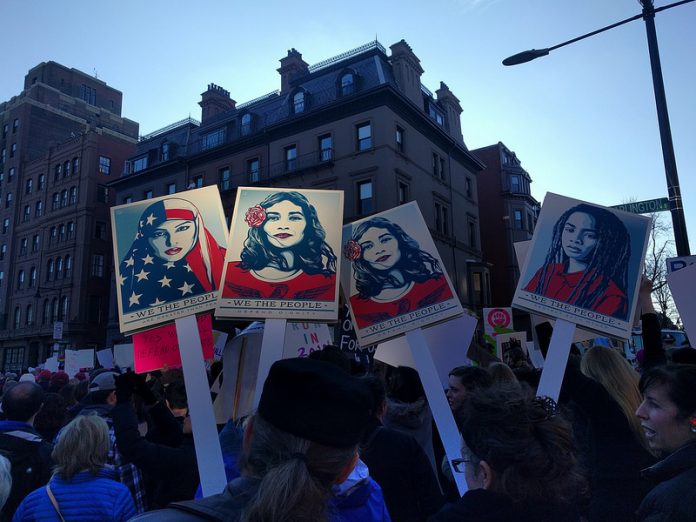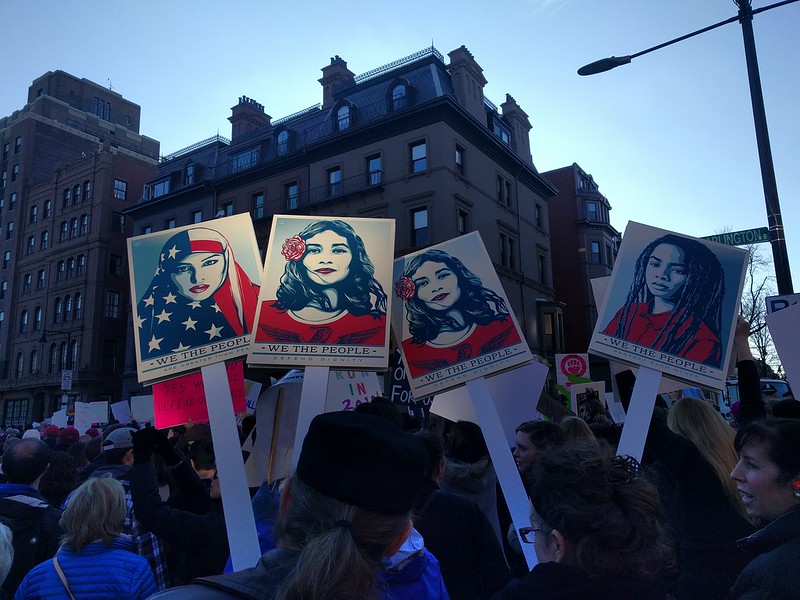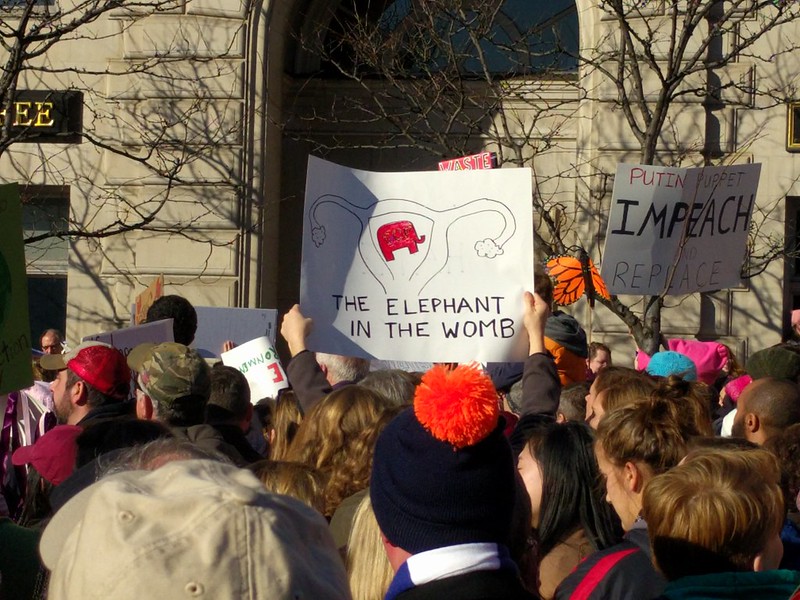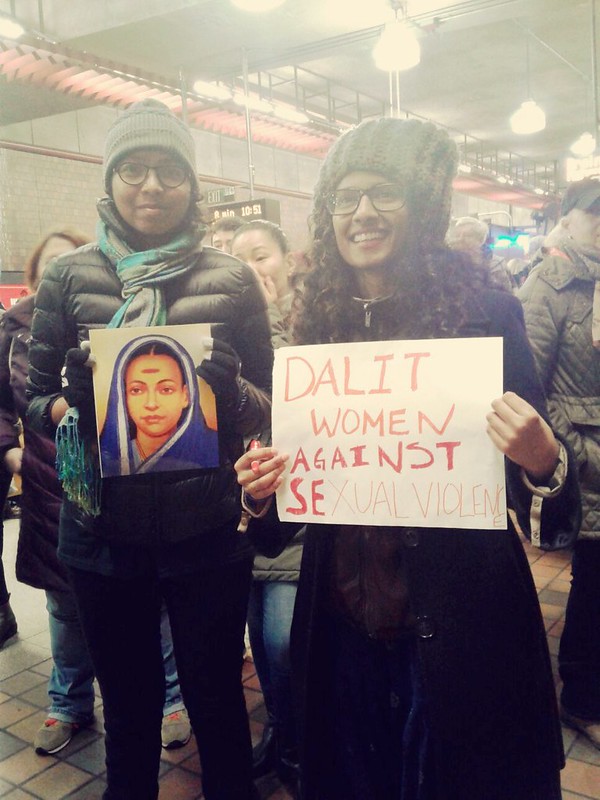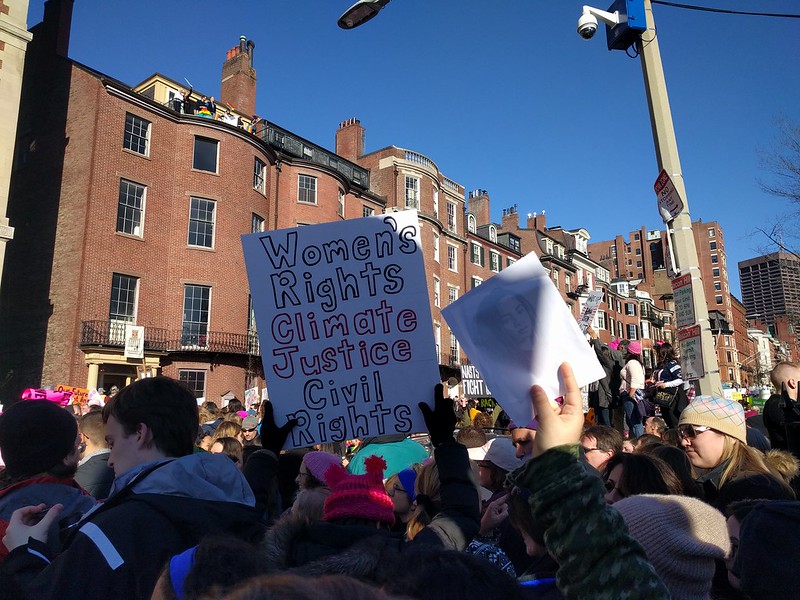By Kashif-ul-Huda, TwoCircles.net
“This is the biggest march I have seen,” said an old timer who seemed to be someone who have participated in lots of marches in his life. Boston Common was packed with people and a massive crowd was in the streets around United States oldest public park. The crowd was packed so tightly that it will take a person good 10-15 minutes to cross the street. Women’s March was organized last Saturday in cities across the United States and there were quite a few global solidarity march as well.
The march was culmination of anger and frustration at seeing a hateful and bigoted figure become elected as President of the United States. Estimates for the historic Women’s March in Boston was 175,000 people while the estimates from all across US range from over 3 million to 4.5 million people.
These were not your typical professional marchers. People who have never been to marches before drove from their suburban homes to be part of the march. Boston’s public transportation service MBTA was running extra trains to accommodate the crowd. And the crowd consisted of overwhelmingly women, mostly white but you can also see Blacks, Latinas, South Asians, and girls in Hijab. Men of different races alongside, families with their young kids, some young ones strapped to their parents’ body, a few in stroller and some on the shoulders of their parents. Many elders in wheelchairs somehow miraculously making their way through this body-pressed-against-body crowd.
Signs at the march were indicative of different motives that have brought people together. While women’s issues such as reproductive rights to sexual harassments to equal pay was at the forefront, people have signs that highlighted range of issues including democracy, climate justice, racial justice, immigrations, etc.
“Abolish the electoral college,” read the sign by Bettina. Electoral College refers to the practice in US Presidential Election where in most US states winner takes all the votes of the votes that he or she carries. This is the reason that Hillary Clinton even after winning more popular votes than Donald Trump didn’t win the presidency.
Another flaw of the Electoral College is that few states gain more influence over the national election so much so that presidential campaigning gets restricted to only a few “swing states.” In many states candidates don’t even visit as in the grand scheme of things their voters are pretty much disenfranchised. I overheard another marcher saying that “no presidential candidate ever campaigns in Massachusetts. They come just for fundraising.” Massachusetts being a predominantly Democratic states, for Republicans it is a waste of time and resources to campaign in a state where they know they are going to lose. For Democrats, they know they are going to win this state so why waste their resources here?
But beyond electoral politics there is a larger politics. Community activist Somnath Mukherji marched with his daughter and wife. When asked why he marched, he replied, “To stand up against racism, patriarchy and misogyny. To stand for minority rights, immigrant rights. I marched to show my daughter that the only way to change society is to show up and participate and engage.”
The crowd was immense but it was also overwhelmingly white, Boston area medical provider and survivor artist Dolly Arjun marched with other South Asians with a sign that read “Dalit women against sexual violence.” When asked why she marched, Arjun said she marched “to show my resistance against the oppression of imperialist White supremacist capitalist patriarchy. I wanted to make sure there was visibility of people like myself expressing this resistance so that this moment in history doesn’t become about White-washed Feminist resistance. I marched because I oppose the history of this country condoning sexual assaulters as presidents and leaders.”
Going a step further, the sign held by Boston-based actor Payal Sharma straight forward asked, “What are you doing to end White supremacy?” highlighting the point the issue is not just a man named Donald Trump but institutional racism and colonialism that is destroying the world.
As if to challenge that White supremacy, artist Shepard Fairey designed three portraits for the Women’s march with faces representing a Muslim woman in Hijab, a Latina, and a Black woman. Many marchers were seen holding these posters. The most popular poster was of the woman in hijab made out of the US flag. This was a direct response to the Trump’s rhetoric about banning Muslims from entering the United States or talks of a Muslim registry where Muslim citizens and residents will be asked to register.
Tahir Ali, spokesperson of The Islamic Society of Greater Worcester drove an hour to be in Boston. He walked with his wife Labiba- their other family members also participated. He hinted that it is time for action, “we just cannot talk the walk but need to walk the walk. The least we can do is join those who are marching for us.”
Speaking of action, I met Nadeem Mazen, first Muslim City Councilor of the city of Cambridge holding a pad with a list of contact information. When I asked him how he felt about the march, he said, “There is a huge crowd here today but I wonder how many of these people will be ready to do something about it come Monday.”
Sara will continue the resistance by donating to @PPact and scientific research. pic.twitter.com/m0uQNrS9Mr
— TwoCircles.net (@TCNLive) January 21, 2017
Sara was holding a big sign “Females are strong as hell,” line from the theme song of the Netflix series “Unbreakable Kimmy Schmidt.” When I asked her how she will continue the resistance, she said that she will donate to Planned Parenthood, a non-profit providing reproductive healthcare for women all across the United States. Donald Trump has promised to defund the organization as Republicans are generally opposed to abortion rights and Planned Parenthood is one of the organization that provides choice to abort unwanted pregnancy.
hear me roar #boswomensmarch pic.twitter.com/SPBf2WVOKF
— TwoCircles.net (@TCNLive) January 21, 2017
The signs and sea of people were energetic and also overwhelming. I walked with the March but couldn’t find the beginning or the end of this flood of humanity. Come Monday the struggle will be real, will people still throng the historical streets of Boston when the order and actions of the new administration impacts only a small group of people? Civil rights activist wrote a generation ago, “Injustice anywhere is a threat to justice everywhere,” the fight for justice is global and beyond our personal identities & struggles, will we rise above ourselves and show solidarity?


